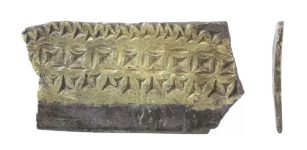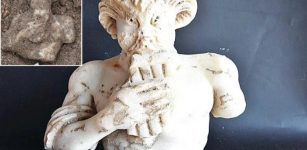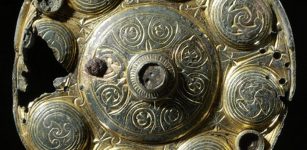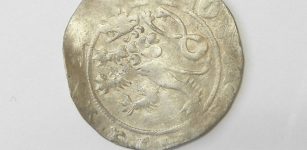King Mithradates VI Of Pontus Used Poison To Avoid Death By Poison
Ellen Lloyd - AncientPages.com - Mithradates VI Of Pontus (120-63 BCE), often referred to as the Poison King, was a brilliant toxicologist. He was obsessed with poison and took small doses of a specially prepared poison to help him develop resistance if some should try to poison him.
 Mithridates - the toxicologist found art of preventing and counteracting poisioning.(4) Galen was the foremost person who practiced and thought the principles of preparing and dispensing medicines. Galenicals-class of pharmaceuticals was named after him. Image credits: American Pharmacists Association
Mithridates - the toxicologist found art of preventing and counteracting poisioning.(4) Galen was the foremost person who practiced and thought the principles of preparing and dispensing medicines. Galenicals-class of pharmaceuticals was named after him. Image credits: American Pharmacists Association
He was impressed by eating poison, murdered his mother to become king, and was Rome's worst enemy. King Mithridates hated the Roman Empire and sent their army west to crush the "Romans, the enemy of all humanity."
Living in times when slipping poison into food or drink was a reality that had been one of the choice methods of assassination for thousands of years, King Mithradates VI began a rigorous program to educate himself on every form of poison. That knowledge would later become his greatest enemy.
King Mithradates VI Of Pontus descended from Alexander the Great and Darius of Persia. He was a powerful king who challenged the late Republican Rome, creating an empire that stretched from the northern reaches of the Black Sea to Syria and Armenia. While loathed by Rome for his massacre of 80,000 Roman civilians in 88 BCE, Mithradates was hailed by Greeks and Persians as a "savior" from oppressive Roman misrule. Rome's Rome's most relentless rival became feared as "the Hannibal of the East."
In time, Mithridates would take the title "the Great" or Megas and be known as Eupator Dionysius. The title, "Eupator," means "born of a noble father," and his connection to the god of wine and revelry, Dionysius (Bacchus-Roman), is evident.
Mithridates VI from the Musée du Louvre.
King Mithradates VI had an excellent reason to become obsessed with poison. The previous ruler and king, Mithridates V, had been assassinated by poison at a banquet in 120 BC in the city of Sinope, the same place where Mithridates VI was born.
Now, of course, King Mithridates VI, who had plenty of enemies, feared he might one day succumb to a similar fate.
King Mithradates VI started to mix different herbs to learn the secrets of poisons. He studied everything he could get his hands on and consulted some of his most trusted advisers. His desire to avoid death by poison became a severe fear of his in an attempt to make sure he was immune to every type and consistency of poison. He developed lethal poisons and then took small, self-administered, non-lethal doses to ensure his immune system could survive.
In our present day, this practice has become known as, Mithridatism which is a system practiced in parts of the world and in unique fields, such as snake handlers or people who work with poisons of a unique nature.
Mithradates' wars against Rome lasted four decades, engulfing three continents.
In the end, Rome was victorious, and King Mithradates VI lost his kingdom and life. Still, he pushed the Roman Republic, already reeling from slave revolts and domestic violence, over the brink of self-destruction and forced reinvention.
Machiavelli praised his military genius. European royalty sought out his secret elixir against poison. His life inspired Mozart's first opera, poets and playwrights recited bloody, romantic tales of his victories, defeats, intrigues, concubines, and mysterious death for centuries. But until now, no modern historian has recounted the full story of Mithradates, the ruthless king and visionary rebel who challenged the power of Rome in the first century BC.
The Poison King describes a life brimming with spectacle and excitement. Claiming Alexander the Great and Darius of Persia as ancestors, Mithradates inherited a wealthy Black Sea kingdom at age fourteen after his mother poisoned his father. He fled into exile... Read more
When King Mithradates VI saw that everything he had fought for was lost, he would shamefully withdraw to the citadel in Panticapaeum surrounded by his enemies who sought to overthrow him. With no way out and the great king and enemy of Rome sensing his end, he decided on his terms to take the noble way out - suicide. His years of strengthening his immune system against the use of poison would prove to be the greatest enemy in his final moments as the sad and furious king attempted to take his life by poison but found it was to no avail.
Thus, ordering a mercenary to run him through with his sword, Mithridates committed suicide and ended the great Pontic Kingdom and its ruler, who hated Rome.
Today, not many people are familiar with the history of Mithradates VI Of Pontus, who challenged Roman imperialism more than 2,000 years ago.
However, in antiquity and the Middle Ages, and even into the 20th century CE, Mithradates was as famous as Hannibal (247-183/182 BCE), Spartacus (c. 109-71 BCE), Cleopatra VII of Egypt (r. 51-30 BCE), and other illustrious enemies of the Roman Republic. His life inspired Machiavelli (1469-1527 CE) and Racine (1639-1699 CE), and one of Mozart's first operas: Mitridate, re di Ponto (1770).
Written by - Ellen Lloyd – AncientPages.com
Updated on February 11, 2023
Copyright © AncientPages.com All rights reserved. This material may not be published, broadcast, rewritten or redistributed in whole or part without the express written permission of AncientPages.com
Expand for referencesReferences:
Matyszak P. Mithridates the Great: Rome’s indomitable enemy
Peter J. Fast - Mithridates VI of Pontus: The Poison King Who Hated Rome
Mayor A. : The Poison King
More From Ancient Pages
-
 Mysterious Mongolian Arc Investigated By Scientists
Archaeology | Jan 2, 2024
Mysterious Mongolian Arc Investigated By Scientists
Archaeology | Jan 2, 2024 -
 Discovered Near Arctic: Mysterious Lost Medieval Civilization And Puzzling Ancient Mummy
Archaeology | Jul 4, 2015
Discovered Near Arctic: Mysterious Lost Medieval Civilization And Puzzling Ancient Mummy
Archaeology | Jul 4, 2015 -
 What Is The Roman Silver Fragment Found In Norfolk? Experts Are Baffled
Archaeology | Mar 27, 2023
What Is The Roman Silver Fragment Found In Norfolk? Experts Are Baffled
Archaeology | Mar 27, 2023 -
 Climate Change May Have Impacted The Rise And Fall Of Middle Eastern Civilizations
Archaeology | Jan 19, 2023
Climate Change May Have Impacted The Rise And Fall Of Middle Eastern Civilizations
Archaeology | Jan 19, 2023 -
 1,700-Year-Old Statue OF Greek God Pan Unearthed In Istanbul
Archaeology | Jun 9, 2023
1,700-Year-Old Statue OF Greek God Pan Unearthed In Istanbul
Archaeology | Jun 9, 2023 -
 Rock Stars: How A Group Of Scientists In South Africa Rescued A Rare 500 Kg Chunk Of Human History
Featured Stories | Oct 20, 2022
Rock Stars: How A Group Of Scientists In South Africa Rescued A Rare 500 Kg Chunk Of Human History
Featured Stories | Oct 20, 2022 -
 Veles And Perun: Most Powerful Slavic Gods In Conflict Between Powers Of Light And Darkness
Featured Stories | Jun 26, 2017
Veles And Perun: Most Powerful Slavic Gods In Conflict Between Powers Of Light And Darkness
Featured Stories | Jun 26, 2017 -
 New Interpretation Of The Domesday Book Of William I The Conqueror
News | Jan 16, 2021
New Interpretation Of The Domesday Book Of William I The Conqueror
News | Jan 16, 2021 -
 Intriguing El Tajin – Pre-Hispanic Ceremonial Site Dedicated To Totonac Rain God
Featured Stories | Jul 17, 2016
Intriguing El Tajin – Pre-Hispanic Ceremonial Site Dedicated To Totonac Rain God
Featured Stories | Jul 17, 2016 -
 Viking’s Symbols Of Travels Prestige And Adventure Were Imported From Abroad
Ancient Symbols | Oct 1, 2015
Viking’s Symbols Of Travels Prestige And Adventure Were Imported From Abroad
Ancient Symbols | Oct 1, 2015 -
 Impressive Copper Age 5,000-Year-Old Fortification With Concentric Walls, Bastions, A Shallow Grave With A Man Face Down And A Dagger – Unearthed
Archaeology | Feb 17, 2025
Impressive Copper Age 5,000-Year-Old Fortification With Concentric Walls, Bastions, A Shallow Grave With A Man Face Down And A Dagger – Unearthed
Archaeology | Feb 17, 2025 -
 Mysterious Ancient Village In A Prehistoric Anomalous Zone – Unexplained Sightings And Sounds – Part 1
Ancient Mysteries | Jul 27, 2020
Mysterious Ancient Village In A Prehistoric Anomalous Zone – Unexplained Sightings And Sounds – Part 1
Ancient Mysteries | Jul 27, 2020 -
 Strange Reports Of A Mysterious Stone-Throwing Phenomenon And Invisible Entity Encountered Worldwide
Featured Stories | Dec 4, 2023
Strange Reports Of A Mysterious Stone-Throwing Phenomenon And Invisible Entity Encountered Worldwide
Featured Stories | Dec 4, 2023 -
 Remarkable Archaeological Discoveries Made Near Bratislava, Slovakia
Archaeology | Oct 28, 2023
Remarkable Archaeological Discoveries Made Near Bratislava, Slovakia
Archaeology | Oct 28, 2023 -
 Kunlun Mountain – Mythical Dwelling Place Of Gods, Sacred Animals And Symbol Of Axis Mundi In Chinese Mythology
Chinese Mythology | Jan 31, 2019
Kunlun Mountain – Mythical Dwelling Place Of Gods, Sacred Animals And Symbol Of Axis Mundi In Chinese Mythology
Chinese Mythology | Jan 31, 2019 -
 Ancient DNA Reveals Unknown Genetic Exchanges Between North And South America
Archaeology | Nov 12, 2018
Ancient DNA Reveals Unknown Genetic Exchanges Between North And South America
Archaeology | Nov 12, 2018 -
 Ancient Cotton Fibers Dating Back 7,000 Years Discovered In NE Israel
Archaeology | Dec 19, 2022
Ancient Cotton Fibers Dating Back 7,000 Years Discovered In NE Israel
Archaeology | Dec 19, 2022 -
 Ancient Maya Ballcourts And Evidence Of Ceremonial Plant Species Offerings
Ancient Traditions And Customs | Apr 29, 2024
Ancient Maya Ballcourts And Evidence Of Ceremonial Plant Species Offerings
Ancient Traditions And Customs | Apr 29, 2024 -
 Was Aztec And Mixtec Turquoise Mined In the American Southwest?
Archaeology | Jun 15, 2018
Was Aztec And Mixtec Turquoise Mined In the American Southwest?
Archaeology | Jun 15, 2018 -
 Prehistoric Human Migration In Southeast Asia Driven By Sea-Level Rise – Study Reveals
Archaeology | Feb 6, 2023
Prehistoric Human Migration In Southeast Asia Driven By Sea-Level Rise – Study Reveals
Archaeology | Feb 6, 2023


